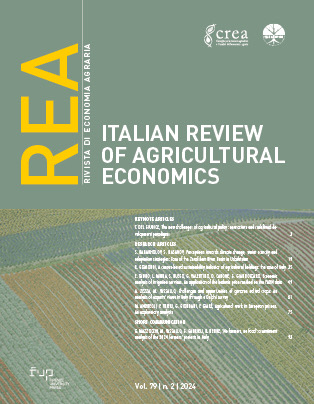Published 2024-09-04
Keywords
- innovation,
- modernization,
- census,
- organic farming,
- sustainability
How to Cite
Copyright (c) 2024 Roberto Gismondi

This work is licensed under a Creative Commons Attribution 4.0 International License.
Abstract
Sustainable agriculture is a critical issue globally. Evaluating it is often hindered by the complex, multidimensional nature of agricultural sustainability and the lack of statistical data at individual farm level. Ensuring the sustainability of Italian agriculture is vital for safeguarding both the survival of smaller agricultural holdings and the competitiveness of larger farms. In this context, the study proposes a methodology to estimate the degree of sustainability of Italian agricultural holdings. The methodology employs five indicators or dimensions – each representing a strategic farm feature related to sustainability – all derived from the Seventh Agricultural Census 2020. The number of sustainability dimensions each farm possesses forms the basis of the methodology. The findings indicate that, in 2020, 45% of holdings had at least one sustainability dimension; this share increases to 72% if the farm manager is under 40 years old. However, a significant sustainability gap remains between the north and south of the country.
Downloads
References
- Arzeni A., Sotte F. (2014). Agricoltura e territorio: dove sono le imprese agricole? QA Rivista dell’Associazione Rossi-Doria, 1: 75-100. DOI: https://doi.org/10.3280/QU2014-001003.
- Bathaei A., Štreimikiene˙ D. (2023). A systematic review of agricultural sustainability indicators. Agriculture, 13, 241. DOI: https://doi.org/10.3390/agriculture13020241.
- Blasi E., Passeri N., Franco S., Galli A. (2016). An ecological footprint approach to environmental-economic evaluation of farm results. Agricultural Systems, 145: 76-82. DOI: https://doi.org/10.1016/j.agsy.2016.02.013.
- Buttinelli R., Cortignani R., Dono G. (2021). Financial sustainability in Italian Organic Farms: An analysis of the FADN Sample. Economia Agro-Alimentare Food Economy – Open Access, 23(3). DOI: https://doi.org/10.3280/ecag2021oa12766.
- Coppola A., Amato M., Vistocco D., Verneau F. (2022). Measuring the economic sustainability of Italian farms using FADN data. Agricultural Economics – Czech, 68(9): 327-337. DOI: https://doi.org/10.17221/169/2022-AGRICECON.
- Dos Santos M.J.P.L., Ahmad N. (2020). Sustainability of European agricultural holdings. Journal of the Saudi Society of Agricultural Sciences, 19(5): 358-364. DOI: https://doi.org/10.1016/j.jssas.2020.04.001.
- FAO (2017). World programme for the census of agriculture 2020. Programme, concepts and definitions. https://www.fao.org/3/i4913e/i4913e.pdf.
- FAO (2019). Methodology for computing and monitoring the Sustainable Development Goal Indicators 2.3.1 and 2.3.2, FAO Statistics Working Paper Series / 18-14.
- FAO (2023). Proportion of agricultural area under productive and sustainable agriculture. https://openknowledge.fao.org/server/api/core/bitstreams/04c03eca-49d4-443c-b38e-16c9e16c01a5/content.
- Fontana E., Fiorillo V. (2023). Agricoltura tra sostenibilità e innovazione. SDA Bocconi – Edagricole – Crédit Agricole. https://www.libreriauniversitaria.it/agricoltura-sostenibilita-innovazione-1-rapporto/libro/9788850656509.
- Gilioli G., Orlando F., Ghiglieno I., Sperandio G., Simonetto A. (2020). Biodiversità e agricoltura sostenibile. Equilibri, 1: 69-76. DOI: https://doi.org/10.1406/97537.
- Gismondi R. (2024). Who are small-scale food producers in Italy? Comparisons among different approaches. Statistical Journal of the IAOS, 40: 289-298. DOI: https://doi.org/10.3233/SJI-230085.
- Gómez-Limón J.A., Sanchez-Fernandez G. (2010). Empirical evaluation of agricultural sustainability using composite indicators. Ecological Economics, 69(5): 1062-1075. DOI: https://doi.org/10.1016/j.ecolecon.2009.11.027.
- Hansen J.W. (1996). Is agricultural sustainability a useful concept? Agricultural Systems, 50(2): 117-143. DOI: https://doi.org/10.1016/0308-521X(95)00011-S.
- ISMEA (2021) Il modello ISIC-regioni. Un indicatore sintetico di competitività dell’agroalimentare nelle regioni italiane. Rete Rurale Nazionale, Roma.
- Longhitano D., Bodini A., Povellato A., Scardera A. (2012). Assessing farm sustainability. An application with the Italian FADN sample. 1st AIEAA Conference: Towards a Sustainable Bio-economy: Economic Issues and Policy Challenges, 4-5 June, Trento.
- Latruffe L., Diazabakana A., Bockstaller C., Desjeux Y., Finn J., Kelly E., Ryan M., Uthes S. (2016). Measurement of sustainability in agriculture: a review of indicators. Studies in Agricultural Economics, 118: 123-130. DOI: http://dx.doi.org/10.7896/j.1624.
- Moulogianni C., Bournaris T. (2021). Assessing the impacts of rural development plan measures on the sustainability of agricultural holdings using a PMP model. Land, 10(446): 1-13. DOI: https://doi.org/10.3390/land10050446.
- Muie S.H. (2022). Novel approaches and practices to sustainable agriculture. Journal of Agriculture and Food Research, 10: 1-11. DOI: https://doi.org/10.1016/j.jafr.2022.100446.
- Proctor F., Lucchesi V. (2012). Small-scale farming and youth in an era of rapid rural change. https://www.iied.org/sites/default/files/pdfs/migrate/14617IIED.pdf.
- Reig-Martínez E., Gómez-Limón J.A., Picazo-Tadeo A.J. (2011). Ranking farms with a composite indicator of sustainability. Agricultural Economics, 42(5): 561-575. DOI: https://doi.org/10.1111/j.1574-0862.2011.00536.x.
- Rocchi B., Stefani G., Romano D., Landi C. (2012). Are Italian farming households actually poorer than other not agricultural households? An empirical analysis. Towards a Sustainable Bio-economy: Economic Issues and Policy Challenges, 1th AIEAA Conference, Trento: 4-5 June 2012. https://ageconsearch.umn.edu/record/124128?ln=en.
- Russo C., Sabbatini M. (2005). Analisi esplorativa delle differenziazioni strategiche nelle aziende agricole. REA – Rivista di Economia Agraria, 4.
- Turchetti L., Gastaldin N., Marongiu S. (2021). Enhancing the Italian FADN for sustainability assessment: The state of art and perspectives. Economia Agro-Alimentare Food Economy – Open Access, 23(3). DOI: https://doi.org/10.3280/ecag2021oa12771.
- Van der Ploeg J.D., Laurent C., Blondeau F., Bonnafous P. (2009). Farm diversity, classification schemes and multifunctionality. Journal of Environmental Management, 90/2009: 124-131. DOI: https://doi.org/10.1016/j.jenvman.2008.11.022
- Velten S. Leventon J., Jager N. Newig J. (2015). What Is Sustainable Agriculture? A Systematic Review. Sustainability. 7: 7833-7865. DOI: 10.3390/su7067833
- Wrzaszcz W., Zegar J.S. (2014). Economic sustainability of Farms in Poland. European Journal of Sustainable Development, 3(3):165-176
- Zahm F., Viaux P., Vilain L., Girardin P., Mouchet C. (2008). Assessing farm sustainability with the IDEA method – from the concept of agriculture sustainability to case studies on farms. Sustainable Development. 16: 271-281. DOI: https://doi.org/10.1002/sd.380

